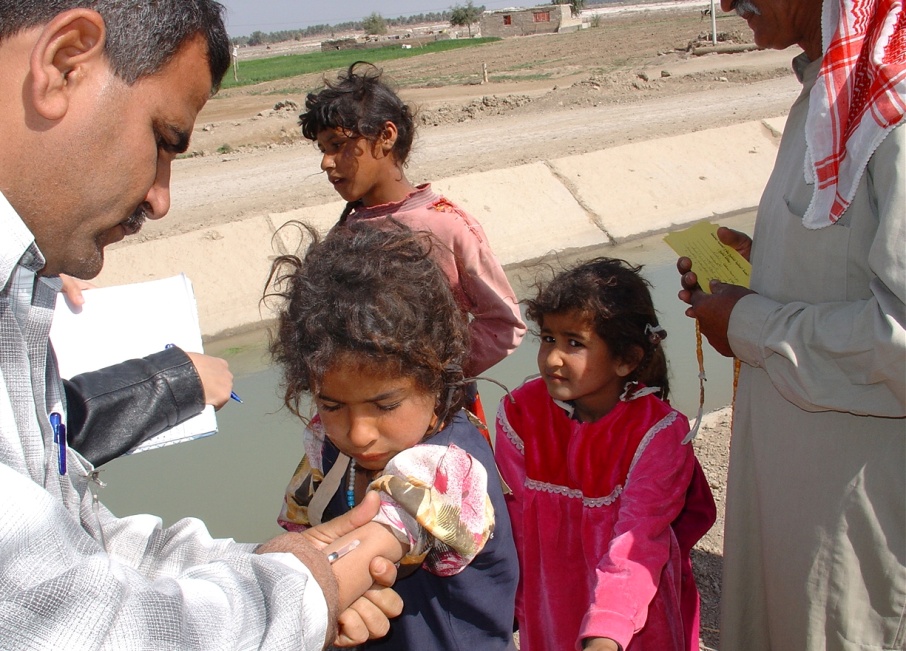27 April, Baghdad-Iraq
The Government of Iraq is introducing Hib (Haemophilus influenza type b) pentavalent (five-in-one) and Rota vaccines in the routine immunization programme starting from mid of June this year to safeguard children from definite vaccine-preventable diseases. MoH tram provides vaccines for children in Baghdad during an immunization campaign in 2010
MoH tram provides vaccines for children in Baghdad during an immunization campaign in 2010
The government's decision to introduce Hib vaccine will protect thousands of infants against some of the most dangerous childhood infections, including the major causes of diarrhea and the major causes of pneumonia and meningitis that is known to lead to permanent neurological disabilities. This decision comes after more than three years of day and night preparations to start a new chapter in the history of the EPI programme in Iraq.
In spite of the fact that the health related indicators to child mortality are steadily improving in Iraq (where the proportion of children dying within the first year of life has dropped from 50 to 35 for every 1,000 live birth, but these infants account for 85% of deaths among children aged under five, still the nation is far from achieving its child health-related Millennium Development Goal (MDG) targets by 2015.
Over the past 25 years, Iraqi children paid the highest price in being exposed to series of negative consequences that resulted from wars, weak health systems and adequate health services that many children did not survive their fifth birthday. Till now, thousands of children dies from Hib disease, and every year, more than 40% of diarrhea cases is reported as being the cause of Rota virus.
The World Health Organization (WHO) maneuvered in 2007 around advocating the vital impact for introducing these vaccines in an aim to reduce the mortality and mobility rate in Iraq. As a result, a scientific data base-study was conducted by the Communicable Disease Control (CDC) and central public health lab following the World Health Organization’s (WHO) guidelines, to verify the importance of using this vaccine and the cost effectiveness behind these integrated costly vaccines in the national vaccination package.
During the past three years, the Ministry of Health in Iraq with full support of the World Health Organization has updated all the vaccine schedules, trained over 7,570 of EPI health workers on vaccine stock management; storage, method of administration and safe disposal to all children and ensured the availability of vaccines at the Primary Health Centers and managing stocks.
In fact, Iraq promises to save the nation's most vulnerable, through providing the vaccines free of charge at all health centers, basic health units, and state-run hospitals as part of its national immunization program. The new vaccines have been imported by the government, reached the warehouses and now under the quality control check, ready to be given to the three and six months infants beginning in the mid of June of 2011.
It is expected after six months of introducing the new vaccines that all children in Iraq will follow the new vaccination package. Therefore, the Ministry of Health jointly with WHO and UNICEF focused on this year nationwide social mobilization, advocacy and educational national immunization campaign which will take place from 24 – 30 May in raising the awareness about the new package, encourage the parent to vaccinate their children and train the vaccination paramedical health workers on how to manage between the new and the old packages,
“A second life opportunity with the help of brave hearts,” this is how we define the great achievement that is taking place in Iraq. Twenty six years and still the Ministry of Health, presented by the EPI programme, is working hard to fulfill their slogan of (NO child DISEASED, DISABLED, DIED from EPI targeted disease).
The rise of the new bright future is ahead for the Iraqi children and is fulfilled with well trusted determination of every partner and team who strides towards enabling one million of Iraqi infants to make further progress towards the reaching the MDGs.
PR Goverment Introduces Two Vaccines to reduce child top killers avialble in English | Arabic
For more information, please contact:
- Ms. Ruba Hikmat, Media and Communication Officer, WHO- Iraq. Tel. +96279-5096066, This e-mail address is being protected from spambots. You need JavaScript enabled to view it
- Dr Omar. Mekki, Medical Officer , WHO- Iraq , This e-mail address is being protected from spambots. You need JavaScript enabled to view it
- Muataz Abbass , EPI programme manager, Ministry of Health, This e-mail address is being protected from spambots. You need JavaScript enabled to view it





